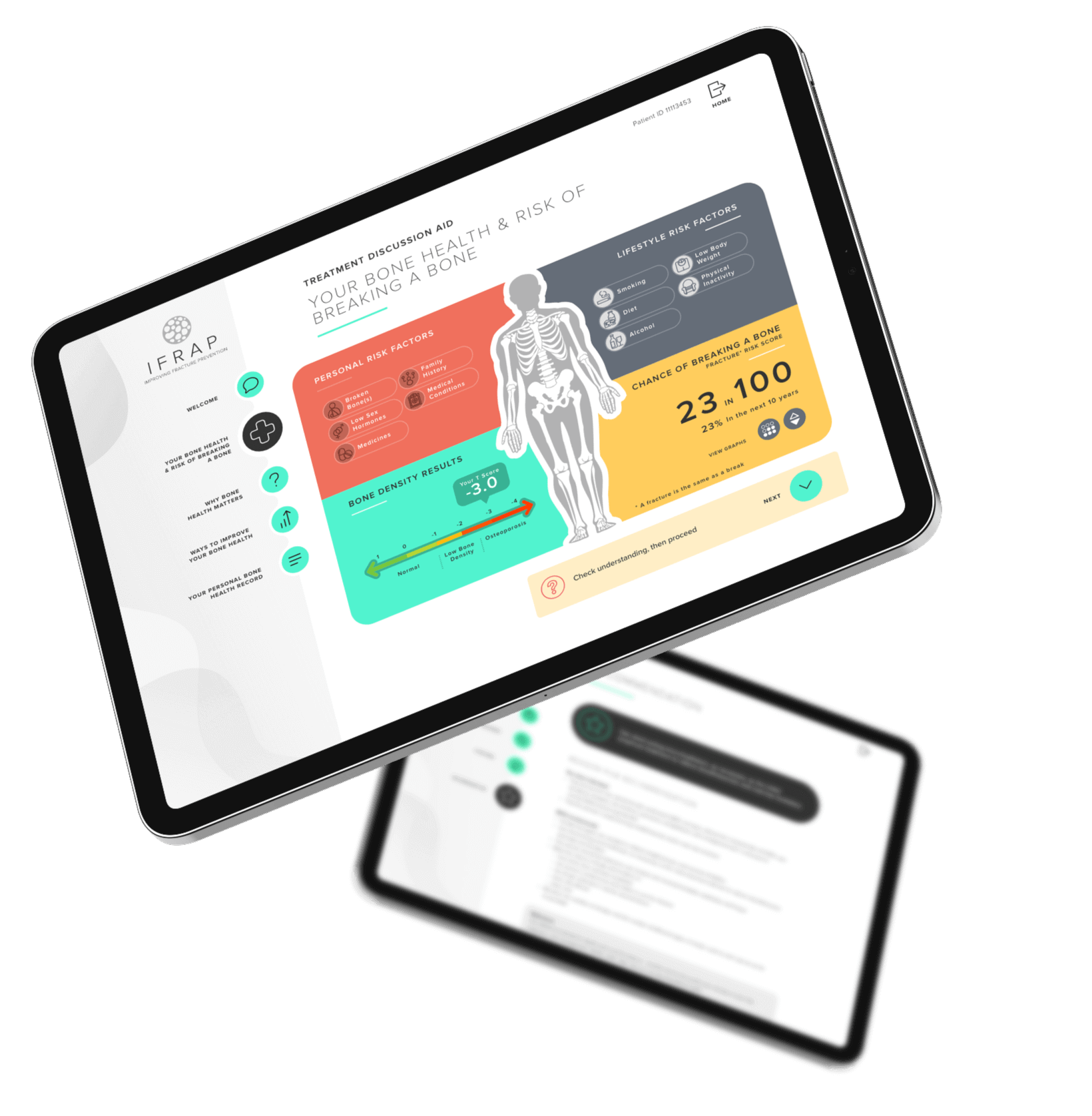Related Projects
A number of linked projects are using or supporting further development of the iFraP resources
The iFraP-2 project builds on the iFraP programme of work that has developed and tested a suite of resources that supports patient-clinician discussions about osteoporosis, fracture risk and treatment options.
iFraP-2 aims to develop and adapt the iFraP resources (clinical decision support tool, clinician training and additional resources) to increase their accessibility, applicability and impact:
The resources will be adapted to be used in a primary care context with two additional versions of the clinical decision support tools being developed:
Through stakeholder engagement, we will determine the clinical decision-making and communication needs of non-specialist health professionals. This will support the development of the clinical decision support tool and identify amendments required to the existing iFraP clinician training.
The project will also include patient and public involvement (PPI) from the Keele Research User Group (RUG) to help shape the self-directed patient tool and community engagement with ‘Seldom Heard Voices’ to determine cultural acceptability of the tool and any adaptations needed. Finally, the patient directed tool will be translated into Urdu, as the second most common language in older populations after English.
The 12-month project started in March 2024 is sponsored by UCB Pharma.
The PHORM study aims to investigate how practice-based pharmacists could deliver osteoporosis reviews in primary care, using interviews and workshops.
Interviews with a wide range of health professionals across primary and secondary care have explored the role of practice-based pharmacists, their perceptions of a new osteoporosis review and their training needs. This study is funded by the Royal Osteoporosis Society
These insights have informed the iFraP 2 study above.
The INDEX study aims to explore how to optimise patient and clinician understanding of dual-energy X-ray absorptiometry (bone density – DXA) scans.
Research has shown that patients have confusions about DXA scans and results, including the purpose of DXA scans, ‘what they show’ and what numeric results mean. These uncertainties can affect commitment to osteoporosis treatment and clinical decision-making about osteoporosis medicines, contributing to the osteoporosis ‘treatment gap’. This research will help us to explore and enhance understanding of DXA scans and results by providing recommendations and a toolkit of resources. INDEX includes an interview study and consensus study to get agreement on recommendations for change.
Links to iFraP: the iFraP decision tool includes visuals to help people understand their bone density and fracture risk results. iFraP tools will be part of a new toolkit to help people understand their DXA results.
More information: https://sapc.ac.uk/conference/2024/abstract/how-can-patient-and-primary-care-professional-understanding-of-bone-density
This Versus Arthritis funded PhD study is being undertaken by Dr Ashley Hawarden. Ashley aims to understand current practice of identifying, investigating, and managing osteoporosis in primary care. This research will also explore barriers towards providing osteoporosis care, and how they can be overcome.
This study involves a scoping review of xxxx, a large UK wide survey of osteoporosis primary care provision (n=342), in depth qualitative interviews and knowledge mobilisation activities.
iFraP resource adaptation (iFraP-2) will be informed by findings.
More information:
Understanding and improving osteoporosis diagnosis and treatment in primary care
The DOMINO study forms the basis of an NIHR Advanced Fellowship for Dr Laurna Bullock. Laurna is exploring the optimal approach to managing osteoporosis for people with dementia or cognitive impairment. As part of this study Laurna will be exploring, if and how, iFraP resources might need adaption for people with dementia or cognitive impairment.



This study has been reviewed and given favourable opinion by East of Scotland Research Ethics Service (reference: 22/ES/0038).